Mean Genes Summary by Terry Burnham & Jay Phelan takes you on a biological journey. It discusses how genes induce humans to behaviors that benefit them and thus transfer themselves to the next generation.
Who Should Read Mean Genes Summary? And Why?
If you fantasize about biological things like DNA, genes, chromosomes, etc. or love reading about the evolution of species, or you’re a big fan of Darwin, you should give this book a shot.
People who are interested in biology, in general, can also read this book.
Why should you read this book?
Because this book dives deep into how our genes affect our behaviors.
It discusses how your genes affect the quality of life you live.
About Terry Burnham
From what I have read on the internet, Terry is a former economics professor at the Harvard Business School.
He was also a biotech entrepreneur.
These days, he teaches finance at Chapman University.
So far, he has authored two books:
- Mean Genes (The book whose summary you’re reading right now.)
- Mean Markets and Lizard Brains
I didn’t find much about him on the internet, though.
Luckily, I stumbled on his website www.terryburnham.com while researching him.
And I found some short academic articles about biology and economics there.
Role Of Genes In Our Life (Why You Should Care)

If you Google a bit about genes, you will find out that genes affect how our cells grow.
I’m not a biologist, so I can’t explain how they work.
But one thing I realized is that they do affect our lives.
For example, people often have diseases that run throughout generations.
What do you think causes that?
All those things happen likely due to our genes, which we get from our parents or ancestors.
And genes don’t just affect us when it comes to diseases; they also affect how we develop habits and behaviors.
Please keep reading to learn more about our mean genes.
Mean Genes Summary (PDF)
In the Mean Genes Summary, I’ll share all the lessons I’ve learned.
So without further ado, let’s dive right in.
1. Our Primal Nature Is To Consume
Have you ever asked yourself:
Why it’s so easy to spend money on useless things that give you pleasure?
Why do you find it painful to save money?
Why does the habit of spending money come naturally to you?
The short answer:
Our genes make it so.
In the old times, when people were hunters and gatherers, they needed to eat a lot to amass energy to hunt and survive.
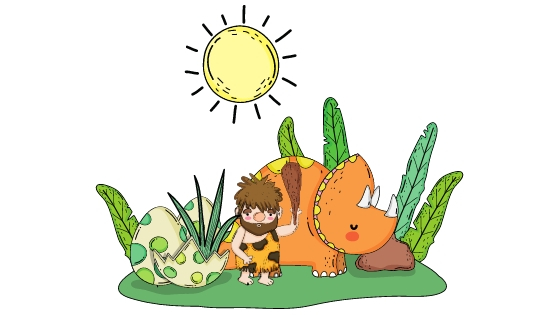
So their fundamental nature was to spend, consume, and then preserve what was left.
And the same habit or behavior has been passed to future generations.
For instance, today, first, we spend money on leisure things, and then think about saving later.
Surprisingly, we don’t even realize it.
Plus, these days, we have credit cards that further encourage us to spend more without thinking.
And since the money spent while using a credit card is intangible, we don’t realize how much we are spending.
Not to mention, if you fail to pay back your money at the end of the period, after using a credit card, the interest rates soar high.
It’s hard to break this habit.
The only way out of this is to hide our money or block it.
By making it less accessible, you’ll be able to control your expenses.
Recommended summaries about money:
But the question is:
Why do we succumb to extravagant habits when we know that we need to be frugal?
Simply put, we often spend money carelessly because it feels good.
It feels good because we carry the genes of our ancestors who loved to consume.
Our ancestors didn’t need financial education to save cash, invest money, and buy stocks. The only thing that mattered the most was survival.
And to survive, they had to hunt and eat.
Again, all this raises further questions:
Can we change our behaviors and habits?
Do all people have patterns similar to those discussed above?
2. Our Genes Are Making Us Obese
Our ancestral genes are making us poor by making us spend more money.
Again, it’s not entirely their fault.
We can’t blame them for everything.
What’s worse, our ancestral genes love storing fat in our bodies.
The author shares the fact that one of every four Americans is obese.
Have you ever looked at your belly and wondered where all this fat is coming from?
Why do we love eating those things that contain calories?
Well, you can partly blame your genes for it.
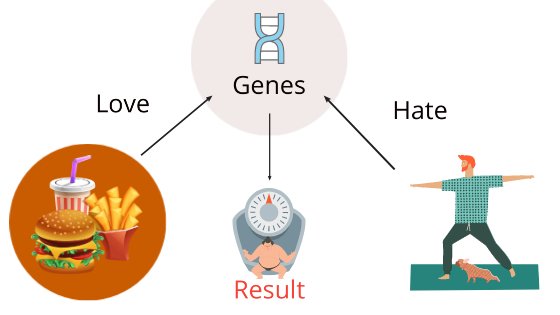
Our ancestors had to hunt for food every single day.
Their bodies would store fat for times of trouble.
Put simply, in those days, fat would give you a sense of security.
But we can’t forget that being hunters, they had to work hard to find food each day.
Now talking about the modern world, we’ve so much comfort.
We don’t need to go and hunt to gather food.
We could easily order food via online apps and get it delivered within minutes.
And not to mention about those burgers and pizzas that give you so many calories.
That’s also why many people find it difficult to shed off that fat.
Are our genes responsible for obesity?
Why do we hate exercise?
We hate doing exercise because our genes have evolved that way.
The worst part:
Those wild genes won’t change any soon.
So you have to adapt to them.
It’s worth noting that the above ideas don’t apply to many people. To some people, doing exercise every day isn’t a big deal. But at the same time, many people struggle with building a healthy routine.
The main idea is that our tendency to adopt harmful eating habits is due to our genes.
And that’s why the author has called them mean in this book.
There is always some mental struggle going on within us.
What we should do and what we tend to do is usually different. (Thanks to our genes.)
3. The Pleasure Centers In Our Brains Affect Our Behaviors
If I were to sum the life of a human, I could divide it into two categories:
- Tasks done to achieve pleasure.
- Tasks done to avoid pain.
Every human, biologically, most of the time, makes decisions purely based on pleasure and pain.
Most people think that “if it feels good, do it again.”
Why do you think more and more people are taking drugs and giving into addictions like masturbation, eating chocolates, etc.?
That’s because they all feel good.
Whenever you do those things, the happy chemicals in your brain fire up and stimulate the pleasure centers in your brain.
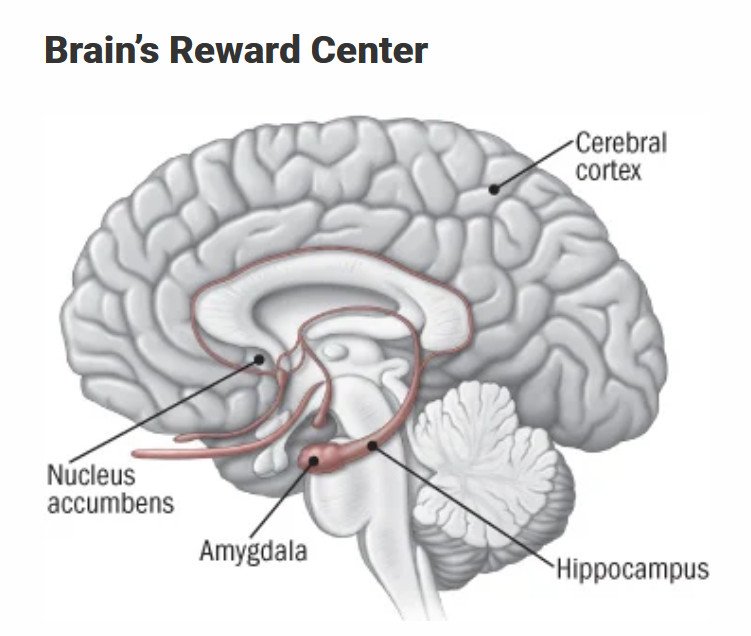
Those pleasuring activities are like drugs.
Even drugs are more accessible today than ever.
What do you think these drugs do?
Taking drugs is one of the fastest ways to trick your brain and feel instant pleasure.
Heck, according to the author, some people can produce erections by stimulating their brains.
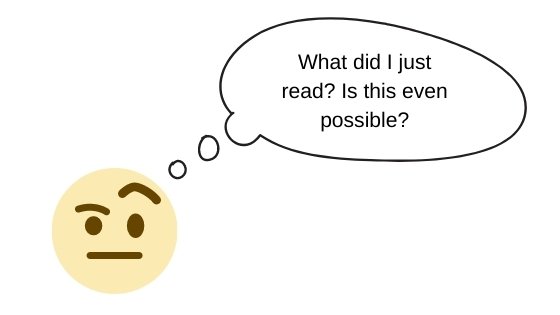
Who do you think is the mastermind behind all this?
You can say that this is the genes’ way of accomplishing their goals.
In real-life, we might not even pay attention to our genes, but they make us do things that are not good for ourselves but good for them.
We often indulge in certain behaviors based on feelings, utterly unaware of our genes’ motives.
Here is an example from the book:
“While we are busy enjoying our org*sms, our genes are laughing all the way to the Darwinian bank. From their perspective, they have successfully made into the next generation.”~Terry Burnham & Jay Phelan
The takeaway: Don’t act based on your feelings. The things that give you pain might be good for you. Conversely, the things that provide you with pleasure might be bad for you.
4. Animals Take Risks To Win Evolutionary Battles
Imagine you’re on a quest to find treasure, and all of a sudden, a giant monster appears in front of you. And that monster holds the map of treasure that you were looking for all that time.
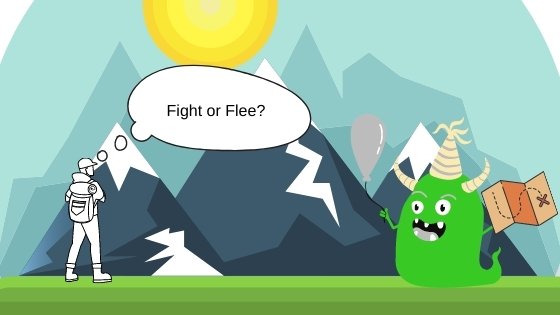
What would you do in that case?
Would you fight that monster or give up?
Does this story sound exciting already?
I don’t know about you, but it sounds like an exciting plot.
What do you think makes this plot catchy?
It sounds exciting because we’ve genes that reward risk-taking behavior.
Let me elaborate.
Taking intelligent risks has helped humans and other animals grow and expand all over the globe.
For example, hunting itself was a risky thing in the past, but hunters risked their lives so that they could enjoy their meals and survive.
When you achieve a victory or accomplish something by taking a risk, your brain releases dopamine, which ultimately makes you happy.
Even animals risk their lives when it comes to their survival and advancing their generation.
Our genes love to transfer themselves into next-generation, which often involves risks and dangers.
And that’s one of the reasons that we love taking risks.
According to the author’s research:
Two and a half million Americans suffer from severe gambling problems.~Mean Genes
Gambling is risky. All Americans understand that.
Then why is it that many Americans still indulge in gambling despite knowing the risks and consequences?
The short answer is:
Because gambling is fun and exciting.
The thrill of making money by gambling is so overwhelming that they succumb to gambling habits.
The takeaway: Risks are unavoidable sometimes. But before taking them, one must make sure that they are worth it.
5. More Money Doesn’t Mean More Happiness
Here we are discussing the age-old debate again:
Does money bring you happiness?
Yes, it does, to an extent.
Otherwise, why would people be happy after buying things they fantasize about.
But the question is:
Does money buy you ever-lasting happiness?
Obviously not.
According to the author, you feel happy when you achieve your goals. But that happiness fades away sooner than you might expect.
For example, if you win a million-dollar lottery tomorrow, you’d be in ecstasy for a few days.
But after a few months pass, you’d be back to your default mood.
That lottery won’t make you as happy as it did earlier.
Look at the data that the author presents in this book:
- “Twenty-five million Americans suffer a major depression every year.”
- “More young people in the United States die of suicide than from AIDS, cancer, and heart disease combined.”
The data above proves that more money doesn’t give a direct and easy path to ever-lasting happiness.
Most Americans are wealthier when compared to other countries. But still, there are suicides due to depression.
Is the money behind all this? I don’t know.
It looks like many factors govern the happiness index.
Do you wonder where did this need to earn more money came from?
Why do Americans work hard and take so much stress to earn more and more?
Again, those mean genes are behind it.
Genes induce you towards the behaviors that benefit them.~Mean Genes
Genes make you constantly crave those things that help them advance.
The takeaway: Don’t keep chasing money all the time. Your happiness depends on a lot more factors than you think. Work on those factors too. Moreover, get rid of the idea that you’ll be happy all the time.
Mean Genes Quotes
“The source of our self-control problems lies within us, in our genes.”-Mean Genes by Terry Burnham & Jay Phelan
“We are each engaged in a battle against our own set of mean genes.”-Mean Genes by Terry Burnham & Jay Phelan
“Old habits die hard, especially when they’re in our genes.”-Mean Genes by Terry Burnham & Jay Phelan
“Our brain, for better or worse, is not an obedient servant. It has a mind of its own.”-Mean Genes by Terry Burnham & Jay Phelan
Mean Genes Review
[amazon box=”0465031242″ template=”horizontal”]
I enjoyed this book.
If you love humorous writing, you’ll enjoy it too.
Although the biological facts sometimes bore me, some of them were funny.
This book sure is a big one, though. It has a total of 869 pages when you read on mobile.
And since I was reading on mobile, it was kind of overwhelming. I had to skip a few paragraphs sometimes.
The author has read many researched articles and then concluded them in this book.
There is plenty of data from experiments and research.
I’ll say that this book isn’t for all, although reading it will benefit you in how you look at biology and this world.
Enjoyed Reading This Book Summary?
If you had fun reading the Mean Genes Summary, share this with your friends.
Now you tell me:
Do you agree that our genes are mean?
Which lesson did you enjoy the most?
Have you ever found yourself with a thin purse due to extravagant behavior?
Share your honest opinion and feedback in the comments below. I’m all ears.
References
The book: Mean Genes by Terry Burnham & Jay Phelan
https://www.ncbi.nlm.nih.gov/books/NBK115604/

